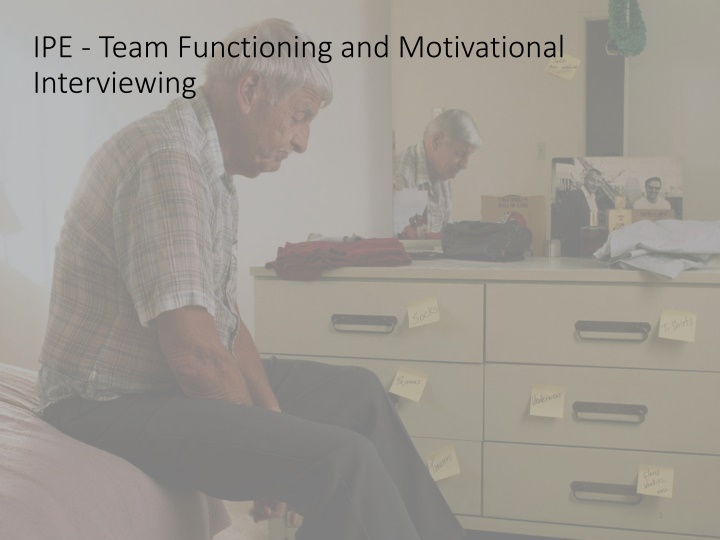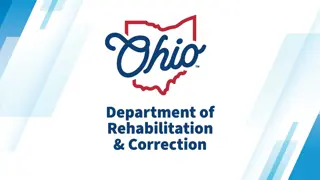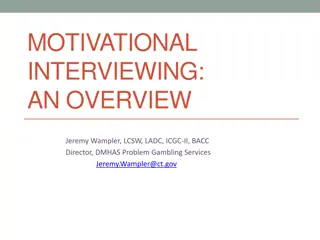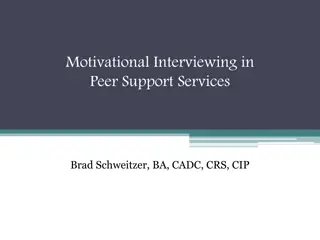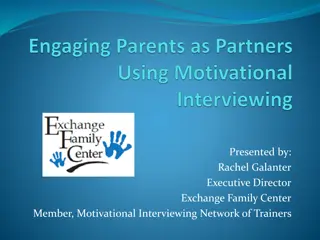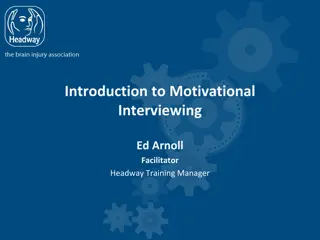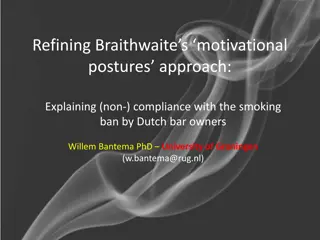Effective Strategies for Addressing Resistance in Motivational Interviewing Sessions
Explore the key concepts of team functioning and motivational interviewing, learn to intervene with clients effectively, and understand resistance as a barrier to change. Discover strategies to address resistance, identify different types of resistance, and learn to navigate through various expressions of resistance in client interactions.
Download Presentation

Please find below an Image/Link to download the presentation.
The content on the website is provided AS IS for your information and personal use only. It may not be sold, licensed, or shared on other websites without obtaining consent from the author.If you encounter any issues during the download, it is possible that the publisher has removed the file from their server.
You are allowed to download the files provided on this website for personal or commercial use, subject to the condition that they are used lawfully. All files are the property of their respective owners.
The content on the website is provided AS IS for your information and personal use only. It may not be sold, licensed, or shared on other websites without obtaining consent from the author.
E N D
Presentation Transcript
IPE - Team Functioning and Motivational Interviewing 1
Learning Objectives To apply your team functioning skills learned from our first session To apply your motivational interviewing skills learned in your discipline specific courses To intervene with a client, Giovanni, in their home
TODAY TODAY Time Activity Learning Objectives Learning Outcomes 1:00-1:30 Welcome Bridge information from Team Functioning workshop and MI lessons Be able to recall key concepts of both TF and MI 1:30-1:40 Break out into small teams and case preparation 1:40-2:10 Round 1 First group completes intervention with client in their home Be able to use MI and TF skills successfully or identify moments where skills would have been used 2:10-2:40 Round 2 Second group completes intervention with client in their home Be able to identify commonalities and differences in each other s roles within the process 2:40-2:55 15-minute break 2:55 3:25 Round 3 Third group completes intervention with client in their home Be able to identify commonalities and differences in each other s roles within the process 3:25-3:45 Consolidation To exchange on some of the key takeaways from each group To create a list of tools for toolkit
Week 3: Motivational Interviewing Principles in interventions with mandated adult clients
Resistance: A Persons Key Barrier to Change Definition: Resistance is: the refusal to accept or comply with something; the attempt to prevent something by action or argument 5 Types of resistance Attitudinal Relationship Motivational Fearful Involuntary
Failure to comply Closed Statements Passivity Subtle Undermining Uncooperative behavior Diversion Creating an illusion of work Limiting ( the scope of discussion) Passive / Aggressive 9 Ways of expressing resistance (Shebib Ch. 8)
Arguing Denying Admitting Fault Ignoring Challenging They are always saying that, it s not true It was a one time thing, I swear, I will never do it again Excuses/ Blameless or blaming I was sick Inattention No response It was Jim s birthday, we all had too much to drink. Okay, so we got out of hand, you know how it is? Side tracking Discounting/ Indifference: It doesn t bother me, so I don t see the problem. My Friends Forced Me It s my parent s fault, I am like this. Minimizing It is no big deal Unwillingness to change I don t think I need to change Hostility Talking over Cutting off 4 categories to help you spot Spotting Resistance:
Internal Barriers to motivating mandated clients substance abuse Personality health Self-sabotage motivation mental illness comprehension Fear of change
Ordering (leads to power struggles) You Must ; You Have to.. ; You will, or . Warning or Threatening (leads to resentment/ resistance) If you don t then.. ; You d better or ; You need to stop that Moralizing, Preaching, Shoulds and oughts (Leads to defensiveness) What you should really do is ; Ya know, you ought to.. ; It is your responsibility to.. Advising, giving solutions, suggestions (leads to a negative attitude or dependence) "What I would do is...," "Why don't you...," "Let me suggest..." Using Logic, Arguing (Leads to defensiveness/lying or feeling belittled) "Doesn't it make sense that if..., " "Here's where you're wrong...," "The facts are..." Criticizing, Judging, blaming ( Leads to stonewalling or defensiveness) "You aren't thinking clearly...," "You have nobody to blame but yourself...," "I couldn't disagree with you more..." Gordon s 12 Road Blocks to communication
Praising, Agreeing, Supporting (Leads to avoiding the issue, or feeling manipulated) "I think you did exactly the right thing!" "I couldn't agree more...," Oh I know, The same thing happened to me..." Labeling, Name-Calling, Ridiculing (leads to defensiveness, lack of empathy) "You're being a worry-wart for nothing...," "You men/ women. kids always think or react...," "Okay, Miss Know-It-All..." Analyzing, Interpreting, Diagnosing ( Leads to shame, embarrassment, lack of empathy) You're just trying to...," "What your problem is...," "You probably feel that way because... Reassuring, Sympathizing, Consoling (Can lead to lack of empathy, avoidance) "Don't worry...," "Look on the bright side..." "Everyone goes through this..." Questioning, Probing, Interrogating (can convey blame Why Qs "Why did you do that?..., How come? "And then what did you say?...," You let your supervisor know, right? Avoiding, Diverting, Ignoring ( Can lead to rejection, showing you fear the client) I can see this is uncomfortable, let s just skip it and move on Other examples? Gordon s 12 Road Blocks continued
FEELS THINKS Angry Screw you! You can t make do this. What power do you have over me? How can you possibly understand how I feel What Involuntary Clients May Feel and What They May Be Thinking Afraid I won t do this! I will lose __ my relationship, my home, my autonomy, my children, my freedom. I don t want to be sober or go to counseling and have to feel all of these negative feelings Powerless Ambivalent, maybe you CAN help, I don t think I can help myself. I have 2 choices do it or else Guilt There is nothing I can do to make this better, I give up. I should have never done that/ How could I have done such a thing? Shame I cannot face the person I hurt. The person I hurt, or My family will never forgive me. I know better, how did I get myself into this mess.
FEELS THINKS Uneasy I don t want this client I disklike them for what they have done. I am afraid of them. I feel manipulated by them. What Workers May Feel and What They May Thinking Rejected They don t trust me. They don t want to be here. I am just another worker trying to tell them what to do. They don t like me. Inadequate I don t know when to intervene I don t know how to convince them they need to do this step. I don t know what the court outcome will be so how can I help them?
Considerations when clients do not follow through with changes necessary as part of the mandated intervention plan (part 1) (Giniac, M., 2015, Institut Pinel) Difficulties Examples of non resolved problems With Transitions Too fast, too many transitions at once (people, places, tasks), fear of change, fear of being alone Following logical order i.e. In a shelter- before bed takes a shower, then eats, then cannot sleep Perseverance with difficult or unwanted tasks Fear of failure? Fear of success? Not knowing how to do something? Feelings coerced. Time management Arrives late to work and loses their job (mandatory for probation) Reflecting on many things at once Overloaded with information? Difficulty prioritizing- what is the most important when everything is important/urgent? Concentration Anxiety? ADD? Lack of sleep? Drugs/ alcohol? Cognitive problems? Considering consequences of their actions. Poor impulse control? Age related perceptions of time and or danger? Lack of experience? Considering possible solutions to a problem Learned helplessness? Lack of experience? Expressing emotions Naming emotions, understanding what triggers them Over-focused attention Obsessing, compulsive behavior to self soothe, inappropriate social skills 14
Difficulties (Part II) Examples of non resolved problems With verbal or written comprehension Language barriers, hearing problems, reading problems, writing problems, education, word processing problems ( too fast ) Managing emotions/ frustrations Understanding triggers, reacting in patterned rigid ways, low distress tolerance or accumulated stress To read between the lines Unable to read non- verbals/nuances/ tone of voice, culturally foreign expressions With barriers, ambiguity, uncertainty Fear, learned helplessness, lack of experience, fear of making the wrong decision, uncertain outcomes, previous experiences of oppression Understanding factors which indicate a change in the plan of action is needed If this happens, I need to do xxxx If I do this, this may happen, then I will need to change These behaviors are going to make the situation worse/ better? Rigid cognitive interpretations All- or- nothing ; generalization I am nothing ; everyone thinks I can tdo it ; Nothing will get better Reading social cues/ non verbals Matching facial expressions and personal space with emotions Social skills deficits in groups, and how behavior affects others How to start / end a conversation, interrupting, leaving too soon, starring, laughing or self disclosure at inappropriate times, Showing empathy for others Difficulty taking another person s perspective, esp.. Authority or someone who does not have the same lived experience Understanding how others perceive one s behavior Tone of voice, non verbals, verbals, aggression, withdrawal, silences, etc. 15
MI is Based on the Trans- theoretical Model of Change
6 Steps for Dealing with Involuntary Clients Legitimate client interests Negotiate the case plan Negotiate aspects of intervention Monitor change and termination Non- Clear the air negotiables
Use your basic Skills Facilitating; empathic skills Validating feelings Honesty Re-Framing resistant behaviour Giving client ownership Challenge- Confront, or use scales- Intensification of discomfort Self-determination
Responding to Change Talk OARS- the cores skills of MI Open-ended questions: Ask for more detail or examples to understand the person s internal frame of reference and feelings, and to strengthen the collaborative relationship. Affirmations: Comment positively about what you heard. This is a direct recognition of particular strengths, abilities, insights, good intentions and efforts of the client. Reflections: They can be simple or complex Allows people to hear again the thoughts and feelings they are expressing and ponder them Keeps the person talking, exploring, and considering Clarify what the client means, their stage of change and level of commitment Summaries: Pull together all the information at the end of a session Include pros and cons and change talk content in summaries Suggest links between present and past material Function to transition from one task to another Provide a what else? opportunity
Change talk : When you hear the person s own statements that favor change, self-motivational statements. Evoking Skills: Recognizing Change and sustain talk Maybe that might work I guess we could try. Of all the options, this one seems doable I want to.. I think I can.. I am not sure how, but I would be willing to try . Sustain talk ( Ambivalence ) VS. When you hear the persons own arguments for not changing, and for maintaining the status quo. Sustain Talk Change Talk Yeah, but I am not going to totally stop drinking, I would have no friends/ life I tried before, it never works So I get out of jail and then I am back in the same situation, it s hopeless. Why should I have to do all the work, they started this mess.
The DARN CATS: Language that signals the clients movement toward change Desires: What is the client s preferred outcome(s)? Ability: What skills, strengths or previous successes can they use to overcome this? What is important to them ( family, friends, housing, jobs/ school, working through emotions, respect, freedom, etc.)? Reasons : What to do they need to get to where they want to go? What do they need emotionally, physically, spiritually, socially? Needs: Can they state they want to commit to the intervention plan? What are barriers to commitment? Commitment: Activation- What stage of change are they in right now? What steps can they propose? What steps are they interested in , that you or other people who are important to them have proposed? Taking steps:
DARN: Listening for and using Questions to Elicit Change Talk Desire SSW: How would you like for things to change? (Open) Client: It seems pointless, but I wish things were different and I could just start over Ability SSW: Of these various options you ve considered, what seems most possible? (reflection) Client: I guess I could move in with my friend who doesn t use drugs, or ,go to detox, get a job, stop seeing my partner. It is all so overwhelming, but I have done it before. Reasons SSW: What are you thinking about , when you consider starting in over again? ( reflection) Client: I don t want to go to jail again. If I have a bigger criminal record, I won t be able to find a job and I will be alone. What would I do with my dog? Need SSW: How serious is this to you? (reflection) OR What do you need to make this work? (open) Client: I am afraid of losing everything again. It is so hard to stay motivated when everything is falling apart around me. No one around me believes I can do better.. I can t do this alone.
CATS CATS: Recognizing The client s Change Talk Commitment: signals the likelihood of action ( Use affirmations, open ended Questions) I will try to ; I promise to ; I guarantee, I will.. ; I intend to (decision with a little doubt) Activation: movement toward but not quite a commitment ( Use open ended questions and summaries to help them understand their plans) I m willing to try .. ; I am ready to . ; I am prepared to . Taking Steps: Actions they have done (Help the client evaluate using scales/ upside/ downside questions and affirmations) I went to AA ; I showed up for my appointment ; I quit doing/ taking .. I tried .
Giovanni Your task As a team, intervene with Giovanni in his home Follow your cheat sheets to help prepare for intervention Each role play is 20 minutes Students who are not completing role play are tasked with providing feedback during debrief OARS Team functioning and Gordon s Roadblocks Journey scenario 25
References Gignac, M. (2015) Conference handout: Considerations when clients do not follow through with changes necessary as part of the mandated intervention plan. Montreal, Institut Pinel. Miller, B. (2011) Anger Management working with clients through a 10 step process. Toronto: Hincks Dell Crest Centre. Miller, WR and Rollnick, S (2012). Motivational Interviewing: Helping People Change (3rd Ed.). New York: Guilford Press. Walters, S. T. ; Clark, M.D. ; Gingerich, R.; Meitzer, M.I. (June, 2007). Chapter 6. Navigating Tough Times: Working With Deception, Violations, and Sanctions. A Guide for probation and parole: Motivating offenders to change. National Institute for Corrections, US Department of Justice. Young, K. Duvall, J. ( 2014) Narrative Therapy Put Simply, Understanding Narrative Practice. Toront: Hincks Dell Crest Centre. 27
